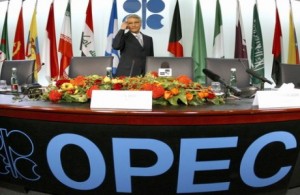Vienna – The Organization of the Petroleum Exporting Countries (OPEC) nudged up its world oil demand forecasts for 2013 and 2014 on Tuesday, citing improved economic sentiment in developed countries, including the United States and Europe.
Demand will grow this year to 89.74 million barrels per day (mbpd), from 88.92 mbpd in 2012, the Organization of the Petroleum Exporting Countries said in its September report.
In August, it had predicted average demand at 89.71 mbpd for 2013. “The bulk of the positive revision came from the OECD regions as a result of better-than expected market sentiment,” the 12-member cartel said, citing “positive signs of improvement” especially in the United States, Britain and Germany.
The US economy was experiencing a “positive momentum” thanks in large part to a boost in private household consumption.
Meanwhile, the eurozone – long suffering a massive debt crisis – saw higher-than-expected in growth in the second quarter of the year, OPEC said.
“Overall, developed economies are recovering — albeit from low levels — amid a slowdown in emerging and developing economies,” it said.
For 2014, the cartel – which pumps about 35 per cent of the world’s oil supply – saw world oil demand averaging 90.77 mbpd, compared to its earlier forecast of 90.75 mbpd.
OPEC also kept its world economic growth forecasts unchanged: at 2.9 per cent for this year, followed by 3.5 per cent in 2014.
In another development, the Organization of the Petroleum Exporting Countries (OPEC) – whose members supply over one in three barrels consumed in the world each day–said “the market at present remains well supplied” despite the North African disruptions.
Saudi Arabia and Iraq have made up for some of the losses in Libyan production; ensuring markets remain well supplied, an OPEC report showed Tuesday.
The news came despite OPEC’s production falling by 1.5%, or 486,000 barrels a day, in August, according to data based on direct communications from OPEC members. Data from secondary sources point to a drop of 0.4%, or 123,900 barrels a day.
Armed strikers have closed most Libyan terminals since the end of July and, according to the data submitted by Tripoli to OPEC, production fell by 52%, or 644,800 barrels a day, last month on average, according to the country’s official data.
But Iraq – whose production increased by 235,000 barrels a day – and Saudi Arabia – up 156,200 barrels a day – compensated for half of those losses, the report shows.



